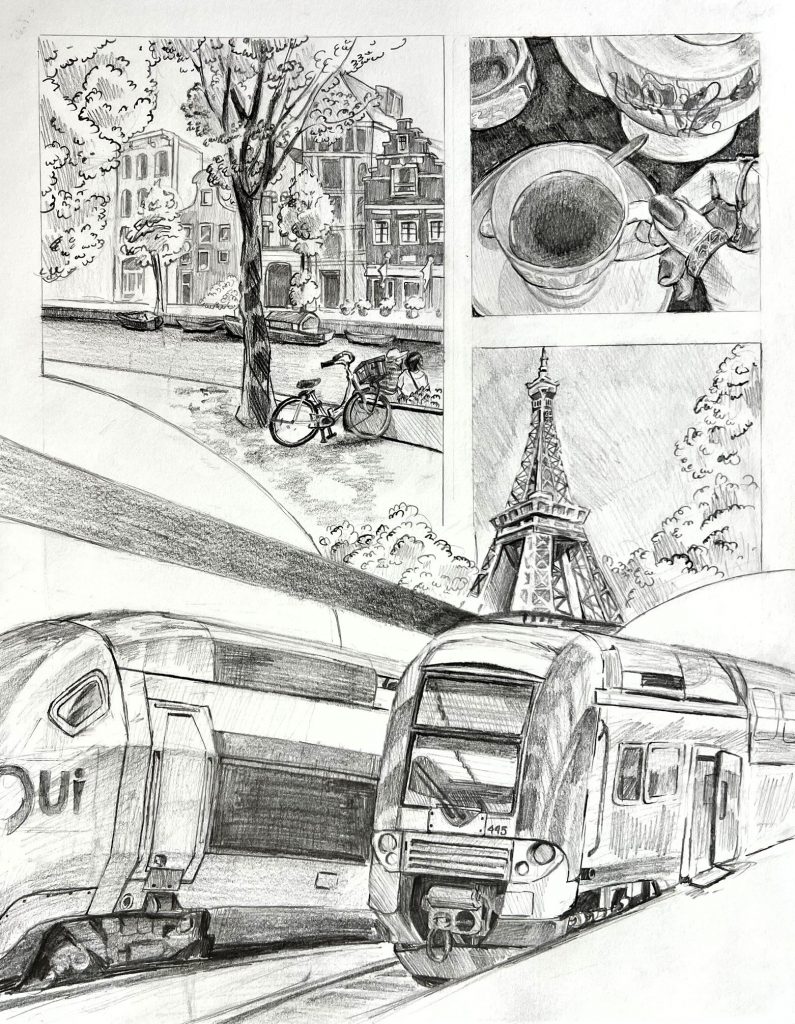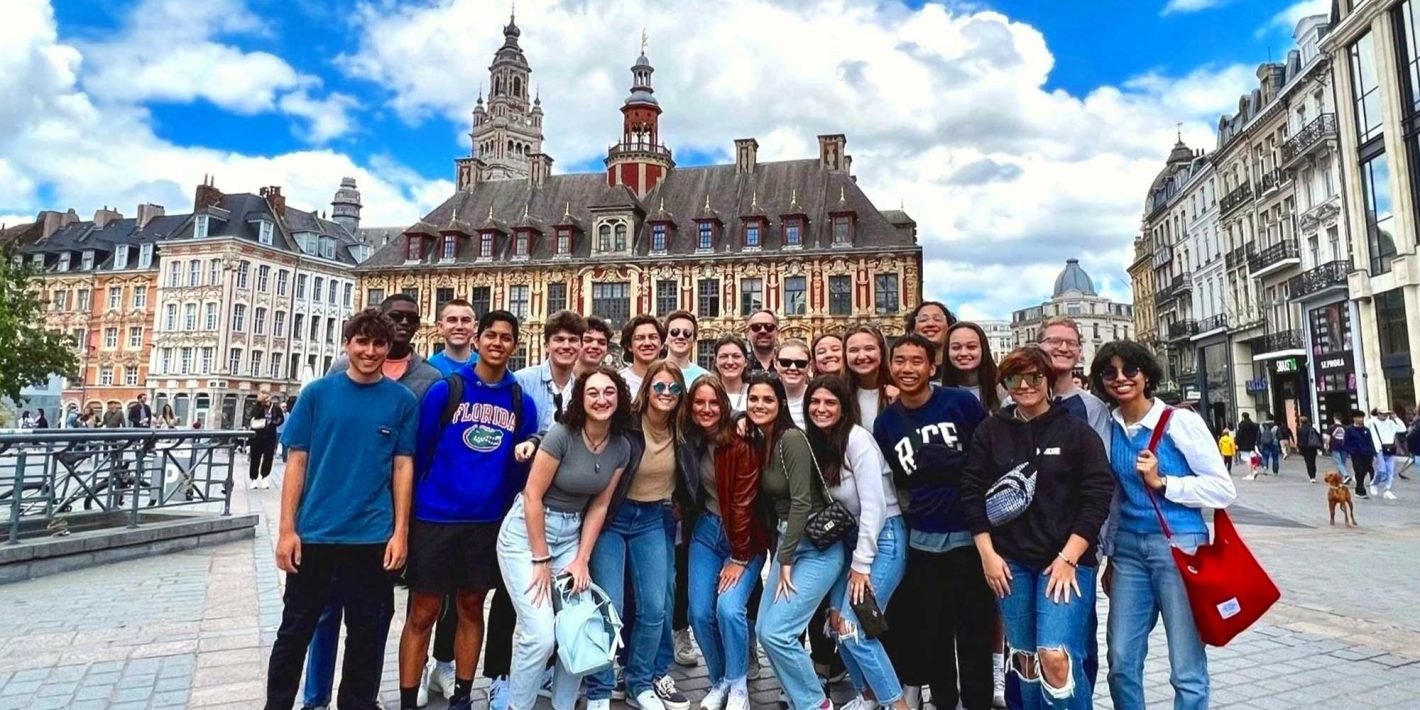The UF in Lille: Engineering and Arts Study Abroad Program, established in 2021, provides engineering students an opportunity to earn critical course credits while also taking in the culture, architecture, and history of northern France. Lille, the fourth most populated city in France, boasts a local student population of 110,000, and is home to Universite Catholique de Lille, the largest university in France. The infrastructure, location, and rich history make Lille an appealing option for visiting students.
“It’s situated perfectly – 50 minutes to Paris by train, an hour and a half to London, and two and a half hours to Amsterdam. The city is spectacular for college students, it’s a young population, with a lot of cultural opportunities and an urban feel without the hectic pace of bigger cities. For first time travelers, as many of my students are, it is a very welcoming place,” UF in Lille Director Joel Parker shared.
The interdisciplinary program promotes engineering discovery and learning through the lens of fine arts. Participants use sketchbooks to allow them to capture their experience by observing and sketching their surroundings. Their drawing experience starts in the classroom, practicing still life drawings from different angles as an opportunity to see things from different perspectives. After four days of classroom exercises designed to get them primed to put pencil to paper, they move their focus out into the streets and parks and buildings in the cultural hub of Lille.
The intersection of art with engineering education produces valuable results. Engineering is often perceived as a precise, objective, and linear process. There is a puzzle, and engineers work to devise a solution. But innovation and genius unfold when one starts to think outside the box. An interdisciplinary approach to learning can yield great results, allowing a student the opportunity to gain more insight and inspiration, more ways to look at a problem, and to apply different perspectives. Creating art allows engineers to think in a nonlinear fashion.
“Engineering is set up to where there is a goal to it; whereas sometimes art is just play, it allows other types of ideas to happen,” Joel mused, “I think engineers struggle with that sometimes, the expectation that everything is going to be objective in their approach, and so by having an exercise where there is no right or wrong, there’s freedom in that.”

An example of a student sketchbook page from the interdisciplinary study-abroad program that brings together engineering discovery and fine arts.
Joseph Benigno, a second-year computer science student shared, “The sketchbook class allowed me to be more laid back about what I was doing, rather than having to be streamlined and so precise in my way of thinking. When you are drawing the city, when you are drawing people, the process makes you look at things differently. You have to consider angles and proportion and scale in a different way, to translate movement to paper. I think that’s important as an engineer – it’s very important to see the world in those details.”
Joel Parker, who is also an Academic Advisor for the Center of Student Excellence, designed the course to help students get out and look closely at how things interconnect. “Part of the course is meant to address that we don’t spend enough time considering the ways that things interact with other things. Oftentimes we take a snapshot and keep on going, but that doesn’t allow us the opportunity to really investigate. The analog, hands on experience of drawing gives you a different input, a different way of thinking, a tactile response.”
Students enjoy looking at each other’s artwork and feel inspired to communicate and share with one another, creating a setting where competition is deemphasized, fostering room for collaboration and connection.
“It was very nice to be out in the field creating; engineering as a student is very competitive, there’s a lot of pressure on you all the time. It seems like the person next to you is always better at something than you all the time. It’s refreshing to be outside, and draw what you want to draw, it kind of broke the mold, of ‘hey we are doing this rigorous engineering study.’ You can hook in more and drink up the environment more fully and it makes you appreciate what you are experiencing that much more,” Joseph enthused.
“Aside from development as a student and the memories, what I really cherish about it is I made a ton of friends and relationships. The people make the trip. I especially enjoyed the time talking with other students, whether we were going out, or getting food, or on an excursion, being surrounded by other engineering students,” said Joseph. “We had opportunities to go on different excursions – Bruges, Brussels, and Ypres. One impactful trip for me was when we visited the beaches of Normandy-the experience and all the history there. The tide was receded, and the shoreline was white and sandy. The water was so shallow that people crossing appeared to be walking on its surface. We went to Mont St Michel and visited a castle on an island; it was absolutely surreal. It was my favorite memory of the whole trip. There was a Mass going on at the top of the church, it was kind of raining and foggy, it all added to the ambience. It was one of the top ten sights to see in the world, something you don’t see anywhere else. Completely jaw dropping,” he recalled fondly.
In addition to Physics and Materials Science, UF in Lille has added more class options, so more students can participate. An honors class and a digital design course through the Department of Engineering Education will be offered in 2024.
“We are expanding, we keep getting bigger and bigger,” Joel remarked. “This year we are taking 74 students. All students are welcome to go (to Lille), although for some, finances are a hurdle. We would love to help students have the resources to go, we have students from all over the world, and it is such an enriching experience. I love seeing that diversity.”
Joel also hopes to see UF in Lille culminate into a course certificate program. “It would be a dream to see an ‘Arts in Engineering’ certificate come out of this, whereby you’re taking a course that is teaching you how to visualize and understand art through mechanical concepts. This program is meant to allow students to combine this very artistic way of thinking to influence their engineering education, and I would like to see UF become a leader in this,” Joel advocated.
“It added layers to my character as a whole, being in a different place, a different culture and landscape; you have to adapt to see a different part of things, you’re exploring new terrain, the language barrier, and it forces you to be everchanging and adapting,” Joseph shared, and Joel added; “It’s transformative, the ways that students come back and approach life afterwards.”
